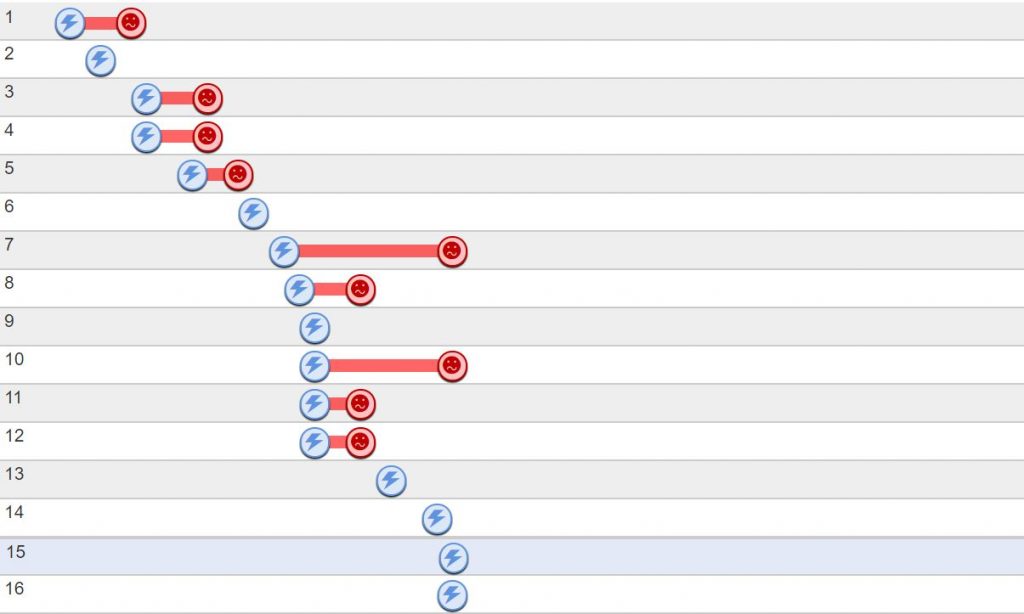
Three Great Reasons Your Query Was Skipped
I am currently in the query trenches. If you are an author who intends to publish traditionally, then you know why they’re called the query trenches. It’s like a war. No, you’re not under constant fire and you are still cozy in your home, but the tension you feel, the explosion that comes with every rejection, the way you harden and turn into a soldier. That is war-like.
If you’re anything like me (and I suspect many authors are), you likely squirrel out every venue where you can keep track of where the agents you have queried are in their slush pile. For me, that’s Query Tracker. Query Tracker has this awesome feature called “timeline,” that lets you see when another writer has logged a response (positive or negative) from an agent regarding their query.
In an ideal world, you click on the timeline once a week (or, you know, once an hour, whatever) and watch as the queries before yours receive responses. Then you can brace yourself for news when it’s your turn.
But, unfortunately, the timeline doesn’t always progress linearly. Sometimes it’s your turn, and you don’t receive a response. The next day you check the timeline and queries after yours have received responses. You’ve been skipped!
Before you freak out that your query was lost or get indignant that you are yet another CNR (closed/no response), I’d like to set out some of the reasons why you might have been skipped.
The Agent Reads Newest Queries First
Okay, this is not exactly a positive reason for being skipped, but at least it is neutral. I’ve read a few agent blogs and tweets that explain how the agent approaches their inbox. Some have the habit of reading from the top down, meaning they read the newest queries first and hope to clear their inbox each day or each week.
While this approach may not seem particularly “fair” to writers, it can explain why your query may seem to be skipped. It may just be that on the day you sent in your query, the agent got a large backlog, and they are working their way through it.
How can you tell if this happened to you? If the timeline seems to jump around a lot, with the most recent queries having older responses than the older queries, this has likely happened to you.
The Agent Set Aside Your Query to Think About It
This is the scenario I like to imagine when I’ve been skipped. Sometimes an agent reads a query and immediately knows they want the full. Those are those “1 day response times” that we’re all jealous of. For the rest of us, an agent may take some time to decide if they want to read our full, so they may set aside your query until they make a decision.
How can you tell if this happened to you? The timeline seems to flow steadily, but there are a few people who have been skipped, maybe one out of every ten or so.
The good thing about being skipped this way means you’re still in the running. The bad part? There’s a chance the agent might forget to send a response if they decide against requesting a full, which leaves you deep in CNR territory.
The Agent Uses Interns to Sort the Slush
Some agents are lucky enough to work with interns who help with, among other things, sorting through the slush pile. Interns have a general idea of what an agent is looking for and help screen out queries that do not follow guidelines or are an obvious no. Getting past one more gatekeeper towards publishing is a good sign that your manuscript (or at least query) is on the right track.
How can you tell if this happened to you? If you look at the timeline and the rejections follow a linear pattern but there are a few people around you that have also been skipped, then this might be what’s happening with your query.
This is perhaps the most exciting reason to be skipped, because it means you are definitely moving forward!
In reality, you might never know why your query was skipped and those who queried after you got a response before you did. For a better understanding of agent inboxes, you might want to check out #tenqueries or follow your favorite agent blogs, as they sometimes throw writers a glimpse of the agent inbox.
Related